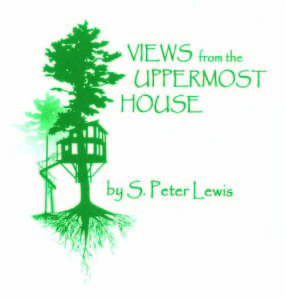Uppermost House: Zeal of the WikiGnome
BN Columnist
Wikipedia is a strange organism. And the anthropomorphism is intentional.
It’s like the earth’s own collaborative and constantly morphing brain. A brain of the people, by the people, and for the people. Literally unthinkable without the Internet, and utterly inevitable because of it. Sometimes awkward and irritating, occasionally unreliable (if not downright infuriatingly), it cannot itself be blamed, for it only and accurately reflects the nature of its myriad authors and countless self-appointed ad-hoc editors.
And one editor in particular is both irritated and irritating. His name is Bryan Henderson. He is at once single-mindedly irritated by the ubiquitous Wikipedia phrase, “comprised of,†and in the same instant irritating to some of the seven-odd billion of the rest of us with his dogged determination to edit the phrase out of existence and into grammatical oblivion. The (not-quite-as-nerdy-as-he-is) worldwide mass-of-the-irritated find his quest bothersome because they just don’t care that much about such syntactical minutia, and thus cannot quite comprehend (nor buy into) his ardent zeal. Like the neighbor’s scruffy dog, who has a salivating love affair with half a brick that he carries everywhere and repeatedly drops drippingly at your feet and then stares at. The fixation doesn’t make obvious sense.
Mr. Henderson, who goes by the user-name “Giraffedata†defends his extirpation of over 15,000 (some sources say over 40,000) occurrences of “comprised of†by describing it as “gibberish†and stating that it is “poor phrasing in Wikipedia.†He goes on to say that “composed of†and “consists of†are better alternatives. “Not everyone agrees ‘comprised of†is wrong,†he wrote. “But no one finds it better than the alternatives.â€
Mr. Henderson strikes me, and perhaps many of you, as simply an intelligent man with an odd penchant; a harmless grammatical nut, tilting at an esoteric verb and preposition combination on his own time and without hurting anyone. A curiosity, perhaps, like a three-legged cat — you marvel briefly at how well he is able to get along in life, and then head for Starbucks.
Yet for many, Mr. Henderson has stirred things up mightily and is not to be dismissed so lightly, regardless of which side of the preposition you fall off of.
Australian tech-journalist Andrew McMillen, who called Henderson the “ultimate WikiGnome,†on a blog post, went on to list his many defenders, quoting them as saying things such as, “[He’s] not a bot (automated software robot)! It’s totally contextual in every article. He’s, like, my hero!†And Mr. McMillen is himself a fan, sending a thank you note to Henderson after discovering his own incorrect use of the dreaded phrase edited out of a magazine article. The WikiGnome fired back almost immediately with, “I love it when people are able to change their grammar based on a logical argument.â€
But said Gnome has his detractors, too. In a 6,000-word article defending his grammatical stance, Henderson said that he once “attracted a stalker, a single editor who reverted about 30 [‘comprised of’ edits] in a row in the same order in which I made them.â€
And in an online article titled, “Why Wikipedia’s grammar vigilante is wrong,†author David Shariatmadari appears to debunk Henderson’s arguments with some pretty impressive data of his own, including quotes from the Oxford English Dictionary and a nifty little graph.
In response to Henderson’s statement in his essay that “It’s illogical for a word to mean two opposite things,†Shariatmadari gives examples and retorts, “If you want logic, speak Vulcan.â€
I could go on and on with this, but I won’t (Google it on your own time and you will be astonished). It’s early April and we have yet to see much bare ground; and I refuse to be either buoyed or discouraged by one modern-day Quixote with an obsession and a delete key.
My life is comprised of grander things right now: the hope for the greening grass and the peeping peeper and the unfurling fern and the alighting goldfinch and that certain damp greenness that comes with a gentle spring rain.


